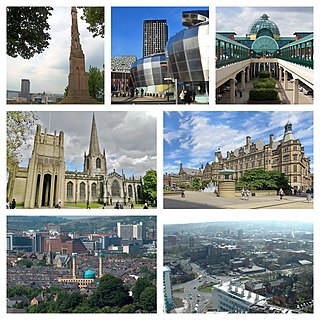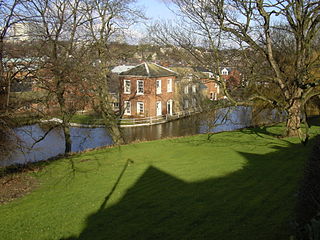
Sheffield is a city in South Yorkshire, England, whose name derives from the River Sheaf which runs through it. The city serves as the administrative centre of the City of Sheffield. It is historically part of the West Riding of Yorkshire and some of its southern suburbs were transferred from Derbyshire to the city council. It is the largest settlement in South Yorkshire.

Def Leppard are an English rock band formed in 1976 in Sheffield. Since 1992, the band has consisted of Rick Savage, Joe Elliott, Rick Allen (drums), Phil Collen, and Vivian Campbell. They established themselves as part of the new wave of British heavy metal movement of the early 1980s.

The Porter Brook is a river which flows through the City of Sheffield, England, descending over 1,000 feet (300 m) from its source on Burbage Moor to the west of the city to its mouth where it joins the River Sheaf in a culvert beneath Sheffield railway station. Like the other rivers in Sheffield, its steep gradient made it ideal for powering water mills and works associated with the metalworking and cutlery industries, and around 20 dams were constructed over the centuries to facilitate this. At its lower end, it is extensively culverted, but parts of it are gradually being restored to open channels, as part of a daylighting scheme for the city.

Joseph Gillott was an English pen-manufacturer and patron of the arts based in Birmingham.

Broomhill and Sharrow Vale — which includes the districts of Broomhill, Broomhall, Crookesmoor, Endcliffe, Sharrow Vale and Tapton Hill — is one of the 28 electoral wards in City of Sheffield, England. The ward was created following the 2015 local government boundary review out of parts of the old Broomhill, Central and Nether Edge wards. It is located in the western part of the city. The population of the Broomhill ward in 2011 was 16,966 people in 5,708 households, covering an area of 2.7 km2. Broomhill & Sharrow Vale is one of the wards that make up the Sheffield Central Parliamentary Constituency.

The Kelham Island Museum is an industrial museum on Alma Street, alongside the River Don, in the centre of Sheffield, England. It was opened in 1982.

Harry Brearley was an English metallurgist, credited with the invention of "rustless steel". Based in Sheffield, his invention brought affordable cutlery to the masses, and saw an expansion of the city's traditional cutlery trade.

The Leadmill is the longest running live music venue and nightclub in Sheffield, England, based on Leadmill Road, lying on the southeast edge of the city centre. It opened in 1980 in a former flour mill, originally a Community Centre.

In 2008, Sheffield ranked among the top 10 UK cities as a business location and aims to regenerate itself as a modern technology and sports based city. Sheffield has an international reputation for metallurgy and steel-making. It was this industry that established it as one of England's main industrial cities during the 18th, 19th and 20th centuries. This industry used Sheffield's unique combination of local Iron, Coal and water power supplied by the local rivers. This fuelled a massive growth in the city's population that expanded from 60,995 in 1801 to a peak of 577,050 in 1951. However, due to increasing competition from imports, it has seen a decline in heavy engineering industries since the 1960s, which has forced the sector to streamline its operations and lay off the majority of the local employment. The steel industry now concentrates on more specialist steel-making and, in 2005, produced more steel per year by value than at any other time in its history. The industry is now less noticeable as it has become highly automated and employs far fewer staff than in the past. However a small number of skilled industrial automation engineers still thrive in it. Today the economy is worth over £7 billion a year.

David Rogerson Mellor was an English designer, manufacturer, craftsman and retailer.

The Globe Works are a former cutlery factory situated in the City of Sheffield, South Yorkshire, England on Penistone Road in the suburb of Neepsend. The Works are a Grade II* Listed Building which in the late 1980s were renovated to provide modern office space. It is part of the Kelham Island Conservation Area.

Cornish Place is a listed building situated in the Neepsend area of the City of Sheffield. The building was formerly the factory of James Dixon & Sons, a Britannia metal, Sheffield plate and Cutlery manufacturer. In the late 1990s the disused building was cleaned and converted into apartments, it is regarded as the most impressive cutlery works that still stands in Sheffield and rivals the cotton mills of Lancashire and the West Riding in terms of architectural quality and heritage. The east and west ranges of the structure are the most spectacular, with Grade II* listed classification, while the rest of the works receive the lower Grade II category. The "Cornish" in the buildings name is thought to derive from the manufacture of Britannia metal which is made up of 93% tin which came from Cornwall.

Leah's Yard is a former collection of small industrial workshops situated on Cambridge Street in the city centre of Sheffield in South Yorkshire, England. The building has been designated as a Grade II* listed building because of its importance as an example of Sheffield's industrial heritage and is currently undergoing a significant restoration to bring it back into use.

Butchers Wheel or Butcher Works is a former cutlery and tool factory in Sheffield, South Yorkshire. The last of the manufacturing tenants left in 2004. The building is a listed historic site, and is now used for residential and retail purposes.

The Beehive Works are a purpose-built cutlery works located on Milton Street in the Devonshire Quarter area of Sheffield city centre. The works were built in stages in the second half of the 19th century and are designated as a Grade II* listed building with English Heritage stating that they are of special architectural and historic interest as an examples of buildings associated with Sheffield's metal manufacturing and metal working trades. The works stand adjacent to the Taylor's Eye Witness Works and together they make Milton Street one of the best places to gain an impression of Sheffield’s former cutlery industry.

The Brooklyn Works is a former site of steel, saw and file manufacture, it is situated on Green Lane in the Kelham Island Quarter of the City of Sheffield, England. In recent years the works have been converted into residential apartments and offices. The structure is a Grade II listed building because of its importance as an example of Sheffield’s industrial heritage. The works stand adjacent to the listed industrial buildings of the Green Lane Works and Cornish Place in what has been called, “the most coherent stretch of industrial landscape in inner Sheffield”

35 Well Meadow Street is the site of a house, attached workshops, courtyard complex and a crucible furnace. It is located in the St Vincent's Quarter of the City of Sheffield in England, it is also part of the Well Meadow Conservation Area. The buildings and furnace are grade II* listed buildings because of their importance as part of Sheffield’s industrial heritage and it is regarded as, “One of the most significant of the city’s 19th century industrial monuments”. It has now been converted into residences.

The Darnall Works is a former steelworks in the Darnall area of Sheffield in England. The only remaining large complex of crucible furnaces, the works opened in the 1835 and were frequently extended and adapted until the late 20th century. Some of the structures at the works are listed buildings, at Grade II* and Grade II, and part of the site is a Scheduled Ancient Monument.

Ernest Wright is a traditional scissors manufacturer in Sheffield, England. The firm was established in 1902 by Ernest Wright Sr., the son of a local scissors-borer.





















